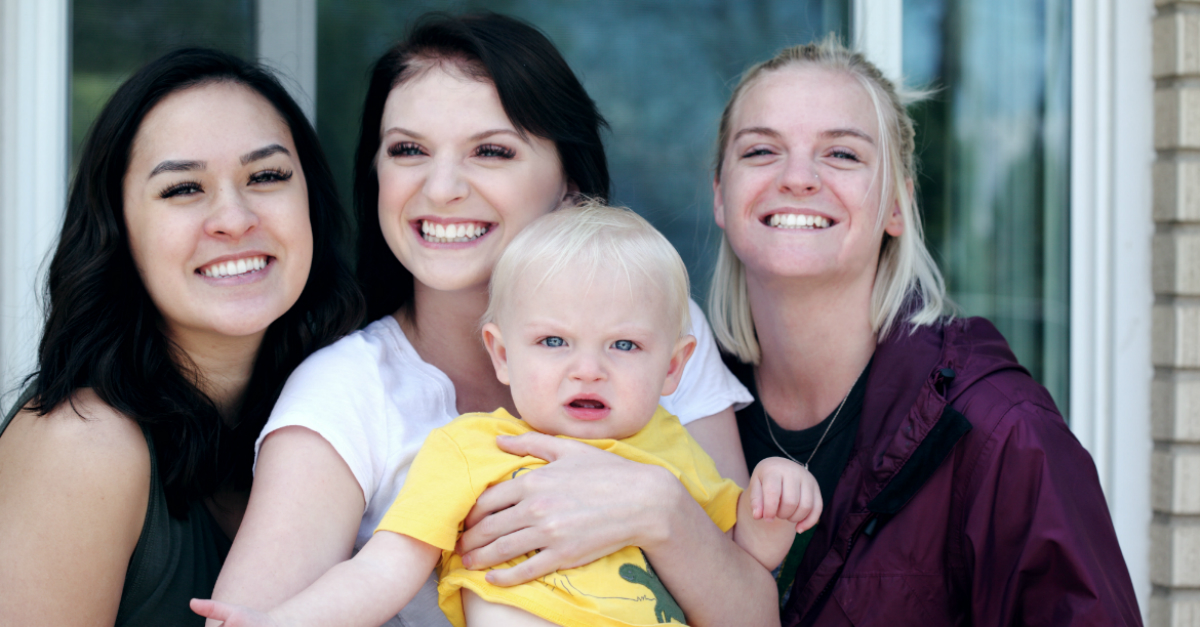9 Practical Tips to Make Your Godly Discipline Stick

One holiday when all of our children and their families were home to visit, our house was filled with the noise and laughter they all bring. Amidst the fun of the uncles trying to outdo each other with their creative ways of flying the children around the house, my toddler granddaughter was removed by her mommy from the “uncle rides” for a diaper change.
When my granddaughter protested my daughter, Meredith, said, “You have to learn to obey mommy, so that you will learn to obey God.”
My granddaughter whined, “Obey God,” as she burst into tears, certain the fun would be over by the time she returned. The scenario brought memories of similar conversations I had with Meredith when she was young.
Meredith could’ve responded to her daughter’s resistance by telling her, “You have a dirty diaper, and your uncles don’t want you to sit on their shoulders until you are clean.” Her statement would have been true—very true, in fact.
Meredith could’ve barked any of the following statements: “Get over here, right now...Don’t make me come after you...You’re making me mad...You’re gonna get it when I catch you.”
Instead, Meredith created a teachable moment. She had wisely taken the time to explain, in two-year-old terms, the value of an obedient life.
She planted a seed in her daughter’s young mind that would reap long-term benefits.
Now, you may be thinking, Teachable moments––I get it. But who’s got time for that? I’m just keeping my head above water and trying to keep my kids from killing each other.
I get it. Parenting is hard, really hard.
Some seasons are more difficult than others. They don’t call it “terrible twos” for nothing––right? And here’s a little secret, whatever issues you and your toddler go toe-to-toe over will likely resurface when they hit adolescence.
Amidst daily parenting, there seems no end in sight. Then, one day, before you’re ready for it––they’re gone. Your nest’s empty and you long for when your house hummed with the hustle and bustle of family life.
Hindsight is always better. I wish I knew then what I know now. In the trenches, it’s hard to see the value of daily disciplines that sap your energy and make you so sick of hearing your own voice.
Can I get a witness? If I could go back and give a pep talk about discipline to my young mom self, here’s what I would say:
1. Find a Mentor and a Community
When I was a young mom I had no real plan for how I would guide my children toward becoming godly adults. The fear of what I didn’t want my kids to become overshadowed my parenting (maybe you can relate).
When I knew I wasn’t the mom I wanted to be, I looked at the mothers of teens in our youth group. The kids who wanted to spend time with their parents stood out to me because so many teens wanted nothing to do with their parents.
As I observed the interactions of these moms with their teens, I knew I needed to learn their parenting secrets. When I asked the moms to help me, they were more than willing to take me under their wing.
There’s something about getting advice from someone who’s walked a mile in your shoes, right? These women were genuine. They didn’t pretend to have all the answers, rather they taught me what they’d learned from both their success and failures.
Making friends with these older women helped me see past the piles of laundry, and sleepless nights, to a time when my children would be grown.
Their insight inspired me not to waste the short time I had with my kids by wishing away the difficult seasons. Their perspective helped me push through when I was tempted to feel too tired, busy, or lazy to do whatever it would take to discipline my children in the nurture and admonition of the Lord.
Think of it this way: you get 18 short years to do one of the most important jobs of your life. And if God didn’t give you children in the traditional manner that time might be less. For example, our oldest son didn’t come to our family until he was 15 years old. But the short time we had with him made all the difference in his life, and ours.
So, make the most of whatever you time you have.
2. Be Consistent
One of the wonderful things I learned from my mentors was to be consistent. Choose what you’re going to say “no” about and then don’t waiver. For example, if your child asks for a snack before dinner, and you say “no” five times before you finally give in, rethink the way you're handling that situation.
Let’s be honest, a snack before dinner isn’t likely going to kill your kid. But you regularly giving in, after you’ve said no, teaches him that if he pesters you long enough, you’ll give in to his demands.
So, plan ahead for how you’ll respond when you know the same scenarios will arise. Contemplate what you’re going to say “no” about––and be generous with your “yes”.

Photo Credit: ©Unsplash/Sharon Mccutcheon
3. Teach Self-control
Set up ways to train your kids in your home when you’re not hard-pressed for time. And most certainly, don’t wait until you're a guest in someone’s home to teach your littles not to touch fragile things. This is always a recipe for disaster.
While it’s easier to put away breakables in your home, you’d be wise to leave out some untouchable items. When my daughter was little, I’d sit in a room with her on the floor playing. I’d explain how the coffee table items were off-limits. Then I’d read my book while keeping a watchful eye. When she reached for the treasures, I’d remind her not to touch.
When she disobeyed, I’d calmly get up to discipline her while removing the treasure from her little hand. Repeatedly, we walked through this scenario. Because my intent was to teach my child how to refrain from touching breakable items, I wasn’t distracted by any other task except the one at hand.
So, I didn’t grow frustrated when she disobeyed. Rather, I welcomed the opportunity to teach her self-control.
It seems like a lot of time just to “practice” at home. But think of the long-term benefit when you’re able to trust your children to refrain from breaking things when you’re a guest in someone’s home.
Note: If you have attachment disorder or special needs children consider alternatives to traditional discipline. Consider insights from this article:
“‘Time outs,’ behavior charts, love withdrawal, deprivation, grounding, and reacting in anger do not work with many adopted children because they often have trouble thinking consequentially, and because isolation feels safe to them (i.e., they fear relationships even though they yearn for relationship).
Remember, this is the bigger picture to keep in mind when you are frustrated by your child’s behavior. Rather than fixing the behavior or understanding your child’s underlying problems based on his history, you need to create safety and security so that she can experience emotional connectedness and healing.”
4. Keep Your Cool
As a parent, anger is never your friend. That’s not to say that kids don’t push buttons or trigger anger. I remember when I was dealing with PMS, my daughter sensed my vulnerability and would invariably use that time to pester me like no other time of the month.
Ephesians 4:26 says, “Be angry and sin not.” When your teen is not answering your texts, your toddler’s flushing a box of tampons down the toilet (true story), or your kids are fighting, to attempt to discipline in anger is the wrong.
If you were raised by parents who yelled, it may come naturally to raise your voice. If you were given the silent treatment when you disobeyed, ignoring your child may be your response. Neither of these are helpful.
Rather than ignoring or lashing out, take time to regroup. Tell your child, “I am angry right now. But I don’t want to sin in my anger. So, I’m going to go to my room. When I’m calm, I’ll be back to discipline you.”
It’s never okay to discipline in anger. If you have a problem with your temper, please reach out for help. Watch: How to Manage Anger in Motherhood.
5. Be Sincere
In 18 years of youth ministry we observed kids pushed to rebellion because of their parent’s hypocrisy. Here are some practical ways to live with sincerity in front of your kids:
When you lose your temper, apologize to your child. Explain how you’ve asked God’s forgiveness and you would like to ask their forgiveness too.
In this manner you’ll teach your child about the normal Christian life. We desire to obey God. When we sin, we repent and ask God to forgive us. We ask forgiveness of the person we have wronged. And we invite God to help us do better next time.
The long-term effect of your child seeing your vulnerability and repentance will teach them more than any lectures you might give on the subject.

Photo Credit: ©Unsplash/Sai de Silva
6. Forgive and Ask Forgiveness
Since resentment over childhood scars is a common pain in adulthood, learning forgiveness is of utmost importance. Forgiveness should be a characteristic of God’s people.
When you teach your children how to pardon another person’s offense, you’ll train them how to be free from the bondage of bitterness. Help them understand how holding onto resentment quenches the Spirit in their life–and hinders their walk with Christ.
Resentful people sow seeds of resentment in their children.
And forgiving people raise forgiving people.
Be quick to forgive, and you’ll teach your kids how to handle discord properly. This habit will reap lifelong blessings that will impact their own marriages and parenting one day.
7. Pray for Wisdom
James 1:5 says, “If anyone lacks wisdom let him ask of God who gives to all liberally.”
Raising the next generation well requires wisdom. Wisdom from godly mentors is necessary, but don’t forget to daily ask God for His wisdom to guide your child’s hearts toward Christ and godly character.
8. It’s Totally Worth It!
Here’s the thing. And don’t miss this. All the work you put into disciplining and training your kids is totally worth it! When my children were little I didn’t realize how all the time, conversations and discipline we put into their upbringing would reap bountiful rewards when they grew up.
Today, our kids and their families are the people we most enjoy spending time with. Seriously, if you’re in the trenches with your kids, it’s hard to imagine the gift you’re giving yourself if you do the hard work of molding their character and their biblical world view.
But take it from me––totally worth it!
9. You Are Not Alone
Joshua 1:9 says, “Be strong and courageous; do not be afraid, nor dismayed, for the Lord your God is with you wherever you go.” You’re not alone my friend.
God is the one who has called you to this parenting thing, and He’s the One who will give you the stamina, wisdom, and strength for the task. The investment you make in training your children can impact their future and the next generation—for eternity.
Rhonda Stoppe helps women build No Regrets Lives. Rhonda is a speaker and the author of 6 books.
With over 30 years experience of helping women build a life with no regrets as a pastor’s wife, mentor, speaker, author, mom & grandmother. Rhonda helps women to:
- Break free from regrets that hold them back
- Grow in wholehearted devotion to Christ
- Find victory over people-pleasing
- Have the marriage others only dream about
- Build a godly legacy to become more influential than they ever dreamed possible
Rhonda is an evangelist and teaches women to build their lives upon the sound doctrine of scripture. Rhonda's messages are biblically engaging, real and captivating.
The Stoppe's have been married 38 years, and are still crazy about teach other. They help others find the secret to a marriage without regrets. Steve & Rhonda are obsessed with their 11 grandchildren. For more about Rhonda visit: NoRegretsWoman.com
Invite Rhonda to speak at your women’s event, or to book the Stoppe’s No Regrets Marriage Conference. Rhonda Stoppe Speaking: Promo Video

Rhonda Stoppe is a best-selling Christian author of seven books. With 40 years of experience in helping women build no regrets lives, Rhonda has become a highly sought after voice in the Christian living community. She has written hundreds of articles for Crosswalk.com and other popular magazines. Rhonda has appeared on The 700 Club, 100 Huntley Street, Family Life Today, Dobson’s Family Talk, and her interviews at Focus on the Family have been named in their Best Of Episodes 2021 & 2023. “I could have listened to Rhonda talk all night,” is what listeners say. Her speaking platform includes: Homeschool conferences, (MOPs) MomCo, MomCon, Legacy Grandparenting Summit and more. She is the host of the award-winning podcast, Old Ladies Know Stuff. Rhonda has over 40 years experience as a pastor’s wife, speaker, mom coach, marriage mentor, mother of four–and did we mention she’s a grandmother of 15! Find out more about Rhonda at NoRegretsWoman.com.
Originally published January 04, 2024.







